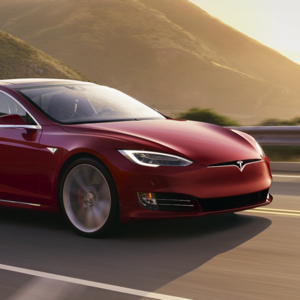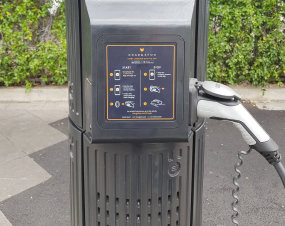The 2017-2018 financial year saw 2.3 billion tonnes of goods freighted over Australia’s roads. The trucks and vans carrying these loads traveled a collective 33.5 billion kilometres, the equivalent to circumnavigating the continent 2.1 million times. All this for a nation of less than 25 million.
The quantities of diesel required to keep Australia functioning are almost as intimidating: freight-carrying trucks burned more than 7200 megalitres over the same period — not counting vans and light commercial vehicles. That’s over 2900 Olympic swimming pools.
Just think of the economic and environmental benefits of reducing that fuel consumption. If combustion trucking was eliminated, we’d have enough left over for every major town in Australia to have its own diesel-filled swimming pool. Win win, right?
And electric mobility is promising to make it happen — The fuel savings, not the swimming pools full of diesel.
Driving change
Volvo Trucks revealed their first all-electric models this week, the FL and FE Electric, slated for initial release in Europe with production starting in 2020. At the same time, the Tesla Semi is undergoing testing in the US for its own production cycle set to start with “limited volumes” from next year.
It’s been obvious for a while now that electric mobility tech has advantages over combustion for commercial use.

Across the globe we’re seeing business fleets and industrial machinery make the switch. Victoria’s first domestic-manufactured, all-electric bus is set to hit Melbourne’s roads this month.
EV tech is coming to an industry near you
The benefits of home-grown electric truck manufacture aren’t just a pipedream. SEA Electric, a Victoria-based company, have been converting light commercial vehicles and trucks to electric mobility since 2017. Earlier this year they produced Australia’s first electric rubbish truck for the city of Casey. If you’ve ever lived with the excruciating volume of early-morning rubbish collection, you’ll know how significant that is.
The noise advantage isn’t the only perk EVs enjoy. Trucks require vast quantities of torque to get their weight moving, something electric motors are uniquely positioned to deliver at the crucial low speed conditions where it’s most necessary.
Similarly, the longstanding roadtrain nightmare of brake failure is neatly sidelined by electric tech. Regenerative braking can be easily used on long downhill sections to both mitigate speed and generate power for the battery. Dual-purpose life and money saving features are exactly the kind of innovation that commercial trucking could use.
So is it that easy? We wait for manufacturers to offer large-scale electrified trucks and road trains, freight companies retire their diesel fleets, and the economy booms forever after? Unfortunately not.
Roadblocks
You’d think that of all the vehicle types moving toward electrification, trucks would be the least concerned with weight. Trucks are designed to carry heavy loads — how much difference could a battery really make?
Well, quite a big difference. While vehicles could theoretically become heavier forever with sufficiently strong parts, roads can’t. Every nation with a publicly maintained road network has limits on the weights that can be driven over those roads. Freight trucks routinely max out these limits to optimise profits, so any extra weight in the truck itself has to be subtracted from the cargo.
And battery packs can be a particularly heavy burden. Passenger EVs almost always outweigh their combustion equivalents, and the issue is only compounded when batteries get bigger — which they need to do to maximise range and carrying capacity.

We won’t know exactly how much heavier electric trucks have to be until they start being manufactured en-masse. Tesla have yet to reveal the gross vehicle mass (GVM) of the upcoming Semi, but most believe it will be significantly heavier than any combustion truck of its size. Youtuber and trucker Geaux Tesla used evidence from a California Highway Patrol Facebook post to estimate the 300 mile-range (483 km) Semi weighs approximately 25,000 lbs (11,340 km), well above the average of similarly sized combustion trucks.
Whether the savings on maintenance and fuel can make up for the deficits in capacity and range will remain to be seen, but the likely answer is that it will all depend on the application. Electric trucks will struggle to break into the longest routes until these problems are solved.
Alternative solutions like the overhead power-delivery pantographs being used in Germany are promising but introduce their own prohibitive costs. Integrating technology for maximum cost-efficiency will be essential in the short term; low-range truck applications like removals are much more likely to see electrification in the next few years than long haul freight.
eHighway trialled on German autobahn
Long haul long term
But we aren’t doomed to rely on combustion-fuelled trucking forever. Innovative battery technologies are being developed specifically to bring the power-per-kilogram figure down and maximise efficiency for long range applications. Solid state battery tech is expected to make its way to commercial applications over the next decade with up to 4x the efficiency of lithium ion.
Chasing the perfect electric vehicle battery
In the meantime, it will be up to companies like Volvo and Tesla to lead the way toward large-scale electric truck manufacturing. Commercial buyers will need to see the models at work for themselves to decide where they might be useful.
So far we don’t even know much about what’s coming. The FL & FE Electric are rated for GVM capacities of 16 and 27 tonnes, respectively, but Volvo haven’t confirmed the weight, price, or range of the trucks themselves.
We’ll be covering developments in batteries, EVs, and electric trucking as it happens on the JET Charge blog. You can contact us at info@jetcharge.com.au with personal EV charging inquiries or follow our Facebook page for regular updates.






